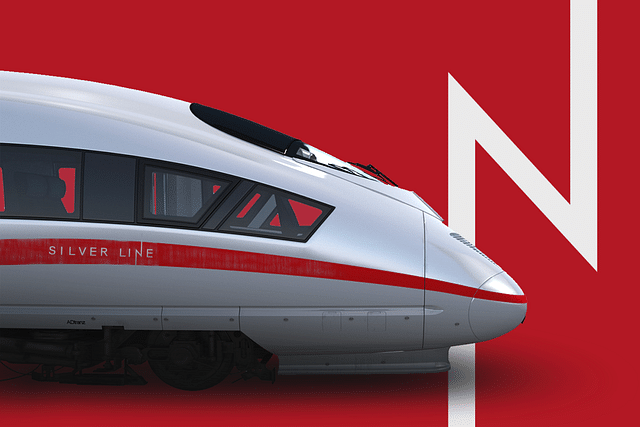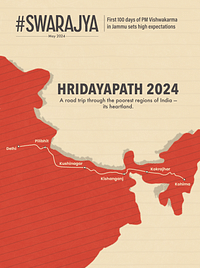Infrastructure
Kerala's SilverLine Project: State Government Spent Rs 9.27 Crore Last Fiscal Despite Lack Of Approvals
V Bhagya Subhashini
May 03, 2024, 06:08 PM | Updated 06:18 PM IST
Save & read from anywhere!
Bookmark stories for easy access on any device or the Swarajya app.

As the fate of the ambitious SilverLine project remains uncertain, recent government figures reveal a significant expenditure from the public exchequer. A total of Rs 9.27 crore has been disbursed to meet the salaries and various perks of officials tasked with land acquisition for the project during the fiscal year 2023-24.
The project involves the construction of a 529.45-kilometre-long semi-high-speed rail corridor connecting the northern-most Kasaragod district with the state’s capital, Thiruvananthapuram, in the south, and running “semi-high-speed trains” at an operating speed of 200 km per hour.
The corridor is to pass through 11 of the 14 districts of Kerala and will be implemented by the Kerala Rail Development Corporation (K-Rail), a joint venture between the Ministry of Railways and the Kerala government.
The Kerala Rail Development Corporation Limited (KRDCL), a joint venture between the state government (51 per cent ) and the Ministry of Railways (49 per cent), spearheads the SilverLine project.
The Rs 63,941 crore crore project, has been in the cold storage for long, with no final clearance from the Railway Ministry.
According to an order issued by the finance department, the allocation includes Rs 7.90 crore for salaries, Rs 56.88 lakh for dearness allowance, Rs 63.41 lakh for house rent allowance, Rs 5.87 lakh for miscellaneous allowances, Rs 5.02 lakh for temporary employees, Rs 1.48 lakh as consolidated pay, and Rs 4.02 lakh for daily wage workers, reports Times Of India.
This expenditure adds to the already hefty sum spent on the SilverLine initiative, which now stands close to Rs 70 crore, despite the project remaining in a state of limbo.
Significant setback
The project encountered a significant setback when a report submitted by the Southern Railways to the railway board advised against releasing land belonging to the Railways for the SilverLine. The report, highlighting concerns about potential adverse impacts on future railway developments, criticised the project's alignment decisions made without consultation with railway authorities.
The proposed alignment along the Tirur-Kasaragod stretch, with 90 per cent overlapping the existing railway line, was particularly contentious. The report highlighted the need for extensive reconstruction of railway facilities if the SilverLine were to proceed in its current alignment, with the burden of half the reconstruction costs falling on the Railways, a financially detrimental prospect.
This stance by the Railways has placed the entire project in a precarious position, given its joint venture nature with the state government.
In December 2022, the railway minister underscored in Parliament that the project's consideration hinges on its techno-economic viability. He emphasised the need for comprehensive technical documentation, including alignment plans and details of affected railway assets, to assess the project's feasibility accurately.
As stakeholders grapple with mounting expenses and logistical hurdles, the SilverLine project stands at a crossroads, awaiting clarity on its future prospects amidst ongoing deliberations and uncertainties.
Save & read from anywhere!
Bookmark stories for easy access on any device or the Swarajya app.
Support Swarajya's 50 Ground Reports Project & Sponsor A Story
Every general election Swarajya does a 50 ground reports project.
Aimed only at serious readers and those who appreciate the nuances of political undercurrents, the project provides a sense of India's electoral landscape. As you know, these reports are produced after considerable investment of travel, time and effort on the ground.
This time too we've kicked off the project in style and have covered over 30 constituencies already. If you're someone who appreciates such work and have enjoyed our coverage please consider sponsoring a ground report for just Rs 2999 to Rs 19,999 - it goes a long way in helping us produce more quality reportage.
You can also back this project by becoming a subscriber for as little as Rs 999 - so do click on this links and choose a plan that suits you and back us.
Click below to contribute.





